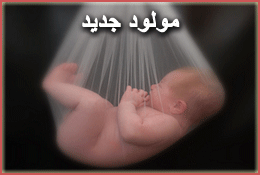-
good job....
-
Hi paditji
al baariHa= yesterday is a colloquial way to say yesterday - ams is the formal way. I think I've heard it said imbari7a too.
كان in the present tense is يكون, تكون
The root of عقبالك is actually قبل which means to accept (in this case). The ع is a future tense marker or to preposition (not sure!) like إلى. The لك is for you. I think so anyway. I think ع is common in the Sham.
I think in the past there was some very major sexism towards newborns in the Arab culture but now, as far as I've heard, it's certainly not the case. -
jookieapc , yes your right there was ! in the pre-islamic age the arabs would bury their daughters alive in the fear that they may bring shame to their tribes, but when islam came it forbade this evil practice, it mentioned in the Quran in chapter 81.
Lower Intermediate - New baby
| February 10th, 2009 | 4 comments |
What do you say in Arabic when one of your friends just had a baby? Ok, you can use congratulations 'mabrook' but what about the cultural aspects to it. In Arabic there are beautiful words for every occasion, and we're sure your Arabic friends will be impressed when you use them. Listen to this for a culturally rich Arabic lesson!

|
 MP3 Download MP3 Download
 PDF Transcript PDF Transcript
|
 Audio Transcript Audio Transcript
 Exercise Exercise
|
|
| Basic | Premium | |
|---|---|---|
Join the Discussion

Random Word
صغير |
|

Advertisement



Ma3 as-salaam...for some reason, my connection only allowed me to listen to this lesson up till 2:40...so I probably didn't hear most of the explanations...
al baariHa= yesterday? what happened to a'ms?
Is it a more formal version of a'ms?
Is anjaba a Form IV verb?
As far as I remember, 'kaana' is only used to represent 'to be' in the past tense. In present, the 'be' is implied. So why did you conjugate kaana for 'she' in present as takoon? Are there special circumstances where kaana is used in the present tense too?
A lot of words in my mothertongue, Hindi (I'm from India) have come from Arabic. I always find it interesting to see how it was derived. During festivals, we say 'Diwali mubaarak', or 'Holi mubaarak' (holi and diwali being the names of the most important Indian festivals). So if b-r-k is to bless, what exactly does mubaarak mean?
Also I thought that the majority of Arabic roots consists of three letters. But 3uqbaalak seems to have 4 (3, q, b, l) . Or is it 3, q and b with l as part of lik (for you). If so, then which form is it in this case? 3uqbaa...
And this is about Arab culture...is the birth of the girl child a welcome event? Traditionally in India and most of East Asia girls are considered economic burdens who will eventually be married off. Most parents pray for male children to continue the lineage. What is it like in the various Arab countries?
Shukran. I hope to hear from you soon :)